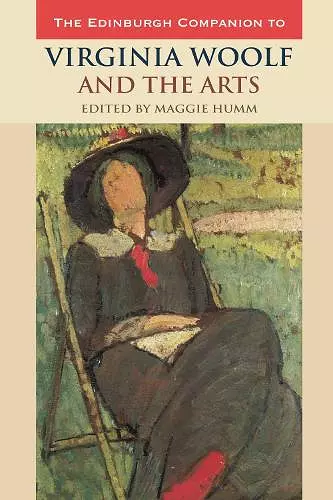The Edinburgh Companion to Virginia Woolf and the Arts
Format:Hardback
Publisher:Edinburgh University Press
Published:19th Apr '10
Currently unavailable, and unfortunately no date known when it will be back

The Edinburgh Companion to Virginia Woolf and the Arts is the most authoritative and up-to-date guide to Virginia Woolf's artistic influences and associations. In original, extensive and newly researched chapters by internationally recognised authors, the Companion explores Woolf's ideas about creativity and the nature of art in the context of the recent 'turn to the visual' in modernist studies with its focus on visual technologies and the significance of material production. The in-depth chapters place Woolf's work in relation to the most influential aesthetic theories and artistic practices, including Bloomsbury aesthetics, art and race, Vanessa Bell and painting, art galleries, theatre, music, dance, fashion, entertaining, garden and book design, broadcasting, film, and photography. No previous book concerned with Woolf and the arts has been so wide ranging or has paid such close attention to both public and domestic art forms. Illustrated with 16 colour as well as 39 black and white illustrations and with guides to further reading, the Companion will be an essential reference work for scholars, students and the general public. Key Features * An essential reference tool for all those working on or interested in Virginia Woolf, the arts, visual culture and modernist studies * Provides a new intellectual framework for the exciting discoveries of the past decades *Draws on archival and historical research into Virginia Woolf's manuscripts and her Bloomsbury milieu *Original chapters from expert contributors newly commissioned by Maggie Humm, widely known for her important work on Virginia Woolf and visual culture *Combines broad synthesis and original reflection setting Woolf's work in historical, cultural and artistic contexts
This book appears at a time when scholarly interest has travelled far down the many tributaries connecting Virginia Woolf to the cultural moment in which she lived and worked. No previous book, however, has attempted an overview of the significance of the arts to Woolf. Hence the need for this all encompassing endeavour. Its breadth of interest catches many topics, from gardens to the aesthetics of the city, from scrapbooks and journalism to dance, music, film, photography and the theatre. It is rich in overlap and fertile creative tensions. Its catholicity also embraces differing levels of debate and a range of methodologies. In some areas it summarises existing knowledge, in others it sets up new avenues of enquiry. But, as a whole, this is a richly variegated assortment of essays. It will, for a long time, remain a most useful compendium. -- Frances Spalding, art historian, critic and biographer The Edinburgh Companion to Virginia Woolf and the Arts gathers a stellar group of scholars to exemplify the range and depth of Woolf's engagement with the arts. This remarkable collection shows that whether engaged with music, painting, dance, cinema, fashion, photography, decoration or entertaining, Woolf stands at the heart of the dynamism and innovations of twentieth-century aesthetics. The Companion will be a rich and provocative resource for anyone with an interest in modern culture. -- Mark Hussey, Editor, Woolf Studies Annual 'Editor Maggie Humm and colleagues can certainly be congratulated on succeeding in this exhaustive and groundbreaking task! Almost every book, essay and autobiographical detail of the author have been seamlessly bound together with the broadest definition of art, from script to screen, page to performance -- making the Edinburgh Companion an invaluable resource for the "common reader" and students of art alike ... Scholars of art, literature, gender studies, film, modernism and -- of course -- Virginia Woolf herself will find the essays in the Edinburgh Companion of considerable interest and appeal at every level.' -- Sarah Powell, Bradford Library Reference Reviews This book appears at a time when scholarly interest has travelled far down the many tributaries connecting Virginia Woolf to the cultural moment in which she lived and worked. No previous book, however, has attempted an overview of the significance of the arts to Woolf. Hence the need for this all encompassing endeavour. Its breadth of interest catches many topics, from gardens to the aesthetics of the city, from scrapbooks and journalism to dance, music, film, photography and the theatre. It is rich in overlap and fertile creative tensions. Its catholicity also embraces differing levels of debate and a range of methodologies. In some areas it summarises existing knowledge, in others it sets up new avenues of enquiry. But, as a whole, this is a richly variegated assortment of essays. It will, for a long time, remain a most useful compendium. The Edinburgh Companion to Virginia Woolf and the Arts gathers a stellar group of scholars to exemplify the range and depth of Woolf's engagement with the arts. This remarkable collection shows that whether engaged with music, painting, dance, cinema, fashion, photography, decoration or entertaining, Woolf stands at the heart of the dynamism and innovations of twentieth-century aesthetics. The Companion will be a rich and provocative resource for anyone with an interest in modern culture. 'Editor Maggie Humm and colleagues can certainly be congratulated on succeeding in this exhaustive and groundbreaking task! Almost every book, essay and autobiographical detail of the author have been seamlessly bound together with the broadest definition of art, from script to screen, page to performance -- making the Edinburgh Companion an invaluable resource for the "common reader" and students of art alike ... Scholars of art, literature, gender studies, film, modernism and -- of course -- Virginia Woolf herself will find the essays in the Edinburgh Companion of considerable interest and appeal at every level.'
ISBN: 9780748635528
Dimensions: unknown
Weight: 1212g
512 pages